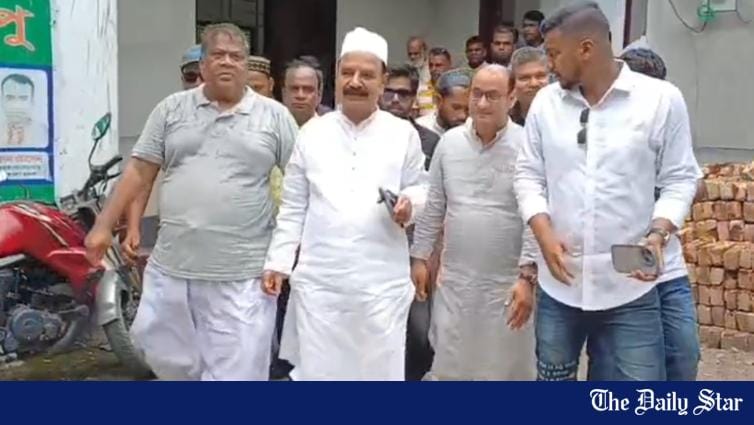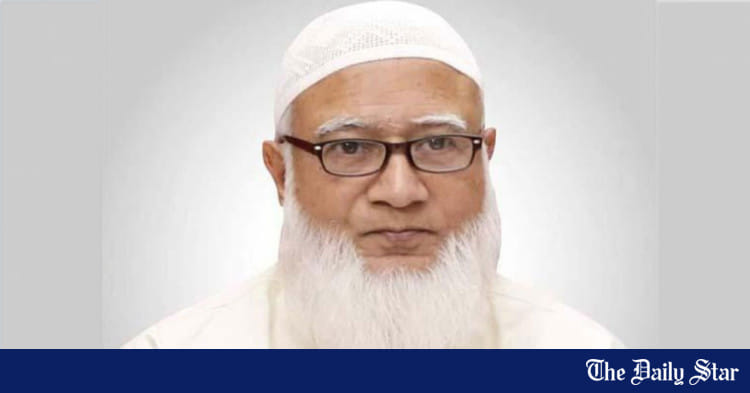Saif
Senior Member
- Joined
- Jan 24, 2024
- Messages
- 17,192
- Likes
- 8,259
- Nation

- Residence

- Axis Group


Jamaat will never come to power in Bangladesh: Gayeshwar Chandra Roy
Everything Jamaat is saying now is intended to sabotage the election, he says
Jamaat will never come to power in Bangladesh: Gayeshwar Chandra Roy

Photo: Collected
BNP Standing Committee Member Gayeshwar Chandra Roy said today that Jamaat-e-Islami will never come to power in Bangladesh – not even until the Day of Judgement.
"Everything Jamaat is saying now is intended to sabotage the election. Awami League isn't in power and they cannot tolerate the idea of BNP coming to power. But I know this for sure, Jamaat will never come to state power in Bangladesh… Other parties may come, but not them. That's certain," he said.
He made the remarks while speaking to journalists around 12:00pm at a programme held at the residence of Mir Sarafat Ali Sapu, BNP's Central Executive Committee Secretary for volunteer affairs, in Srinagar upazila, Munshiganj.
"They (Jamaat) cannot comprehend the sentiments of ordinary people. Without understanding the language of the masses, they seek to achieve their own agendas. Those who do not recognise the Liberation War, who say it was a war between India and Pakistan rather than a war for our independence – the people of Bangladesh no longer have the time to give importance to such statements. Their aim is to sabotage the election," he said.
Questioning further, Gayeshwar asked, "Those in Awami League who have committed crimes will face justice. But why shouldn't they be allowed to form a party?"
Also present at the event were BNP Joint Secretary General Abdus Salam Azad; Mir Sarafat Ali Sapu; former foreign secretary Mohsin Ali Khan; Munshiganj BNP Convening Committee members Awlad Hossain Uzzal and Jasim Molla; and Mahmud Hasan Fahad, organising secretary of the district's Women and Child Rights Forum, along with leaders and activists of BNP and its associate bodies.4
Photo: Collected
BNP Standing Committee Member Gayeshwar Chandra Roy said today that Jamaat-e-Islami will never come to power in Bangladesh – not even until the Day of Judgement.
"Everything Jamaat is saying now is intended to sabotage the election. Awami League isn't in power and they cannot tolerate the idea of BNP coming to power. But I know this for sure, Jamaat will never come to state power in Bangladesh… Other parties may come, but not them. That's certain," he said.
He made the remarks while speaking to journalists around 12:00pm at a programme held at the residence of Mir Sarafat Ali Sapu, BNP's Central Executive Committee Secretary for volunteer affairs, in Srinagar upazila, Munshiganj.
"They (Jamaat) cannot comprehend the sentiments of ordinary people. Without understanding the language of the masses, they seek to achieve their own agendas. Those who do not recognise the Liberation War, who say it was a war between India and Pakistan rather than a war for our independence – the people of Bangladesh no longer have the time to give importance to such statements. Their aim is to sabotage the election," he said.
Questioning further, Gayeshwar asked, "Those in Awami League who have committed crimes will face justice. But why shouldn't they be allowed to form a party?"
Also present at the event were BNP Joint Secretary General Abdus Salam Azad; Mir Sarafat Ali Sapu; former foreign secretary Mohsin Ali Khan; Munshiganj BNP Convening Committee members Awlad Hossain Uzzal and Jasim Molla; and Mahmud Hasan Fahad, organising secretary of the district's Women and Child Rights Forum, along with leaders and activists of BNP and its associate bodies.4









































